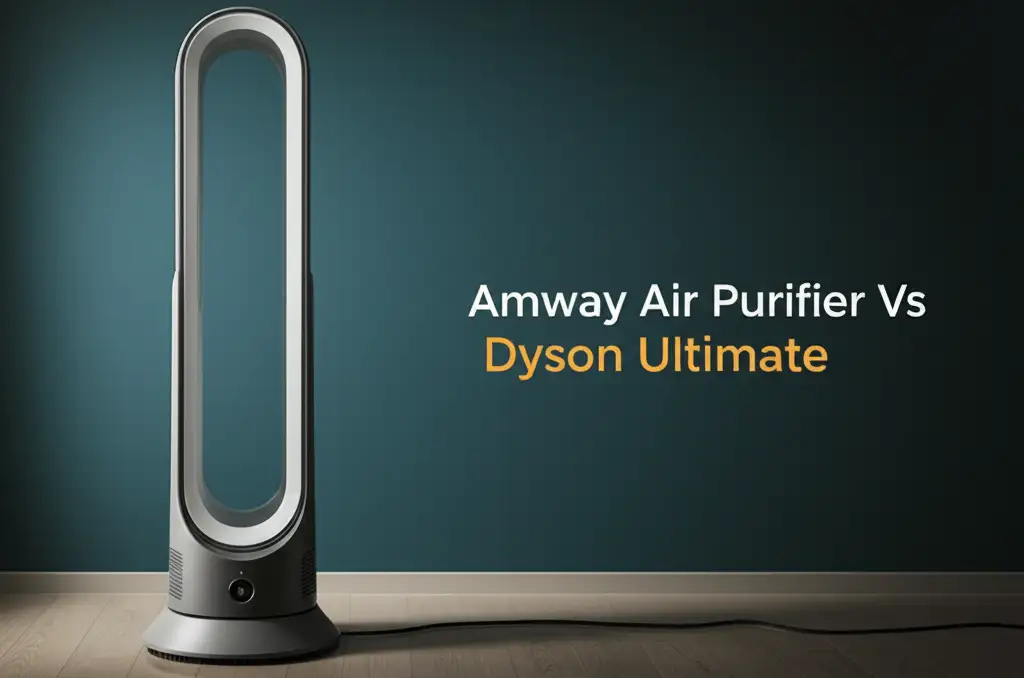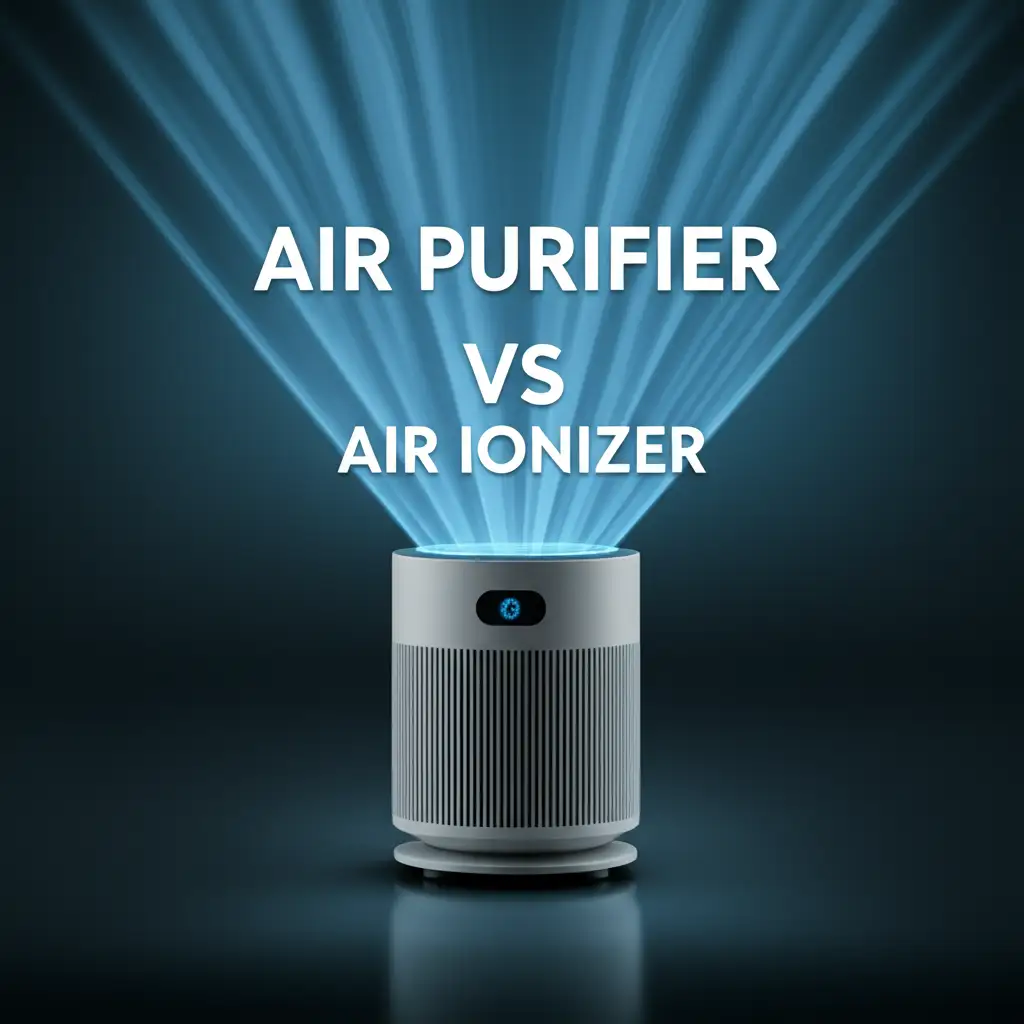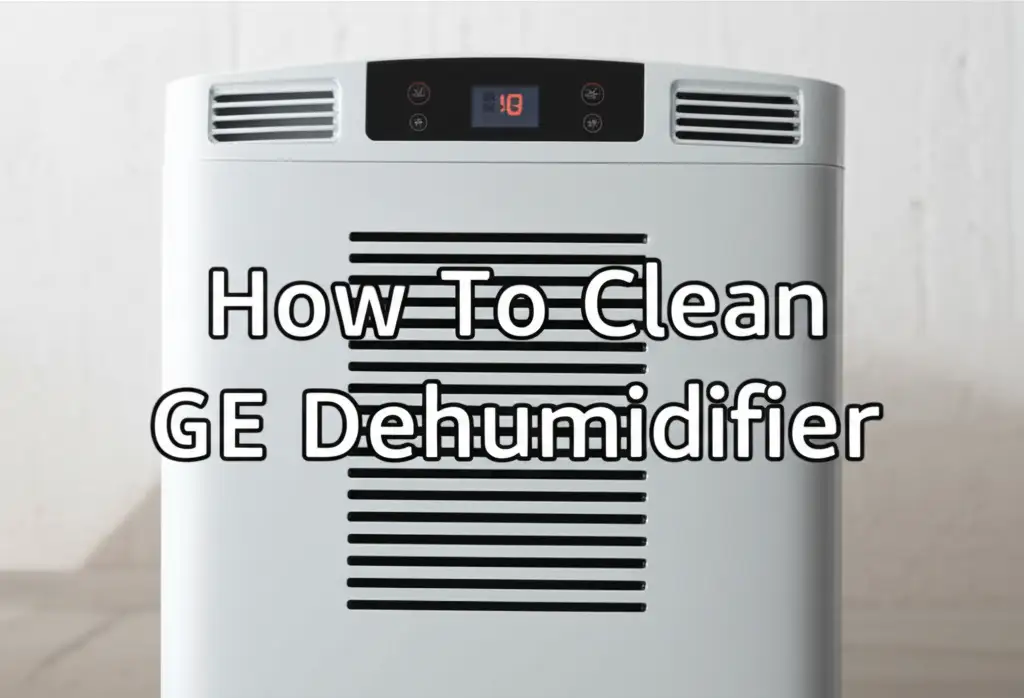· Elira Thomsen · Air Quality · 19 min read
Amway Air Purifier Vs Dyson Ultimate

Amway Air Purifier vs Dyson Ultimate: Which Cleans Better?
Breathing clean air indoors is vital for our health. You might notice dust settling quickly or experience sniffles indoors. This often points to poor indoor air quality. Choosing the right air purifier helps remove pollutants. Today, we compare the Amway Air Purifier vs Dyson Ultimate models. We will look at their filtration capabilities, smart features, and overall value. This comparison will help you decide which one best suits your home’s needs and budget.
Takeaway
- Amway Atmosphere Sky: Offers robust multi-stage filtration, focuses on removing a wide range of contaminants, and provides comprehensive air purification. It excels in core air cleaning performance.
- Dyson Ultimate: Integrates purification with heating, cooling, or humidification, offering versatile climate control alongside air cleaning. It provides a sleek design and advanced smart features.
- Filtration: Both use HEPA and activated carbon filters, but Amway often boasts higher CADR and certified allergen removal.
- Cost: Amway has a higher initial cost but potentially longer filter life. Dyson has a premium price, with varying filter replacement costs.
- Features: Dyson stands out with multi-functionality and smart app integration. Amway focuses solely on advanced purification.
When comparing the Amway Air Purifier vs Dyson Ultimate, the Amway Atmosphere Sky typically provides a dedicated, high-performance filtration system designed for thorough air cleaning, while Dyson Ultimate models offer a blend of air purification with climate control functionalities, emphasizing design and smart features. Your choice depends on whether you prioritize dedicated, robust purification or multi-functional design.
Understanding Air Purification: A Core Need
Indoor air can be more polluted than outdoor air. Common indoor pollutants include dust mites, pet dander, pollen, mold spores, and volatile organic compounds (VOCs). These particles can trigger allergies, asthma, and other respiratory issues. An effective air purifier removes these contaminants. It circulates air through multiple filters. This process traps harmful particles, delivering cleaner air back into your room. We all want to breathe easier at home.
The need for clean air has grown. Modern homes are often sealed tight for energy efficiency. This traps pollutants inside. Cooking fumes, cleaning products, and even furniture can release harmful chemicals. An air purifier acts as a vital tool. It helps maintain a healthy indoor environment. You might wonder if an air purifier is similar to a fan. While both move air, an air purifier vs fan difference lies in their core function: purification. A fan cools, an air purifier cleans.
Many people think about general air quality. However, specific concerns like mold or dust also matter. An air purifier helps with these. For example, if you worry about mold, an air purifier vs dehumidifier for mold offers different solutions. A dehumidifier removes moisture, preventing mold growth. An air purifier cleans mold spores from the air. Understanding these differences helps in selecting the right device for your home environment.
Amway Atmosphere Sky: A Deep Dive into Filtration
The Amway Atmosphere Sky air purifier is known for its powerful filtration system. It uses a three-stage process to clean the air. First, a pre-filter captures large particles like dust and pet hair. This extends the life of the other filters. Second, a HEPA filter removes tiny particles. This includes pollen, mold spores, dust mites, and bacteria. It traps particles as small as 0.0024 microns. The HEPA filter makes a big difference in air quality.
The third stage involves an activated carbon filter. This filter targets gases, odors, and volatile organic compounds (VOCs). VOCs come from paint, cleaning products, and even new furniture. The carbon filter effectively neutralizes these harmful chemicals. This multi-layered approach ensures comprehensive air cleaning. It aims to address almost all common indoor air pollutants.
Amway emphasizes the certified performance of the Atmosphere Sky. It holds certifications from organizations like AHAM (Association of Home Appliance Manufacturers). These certifications confirm the unit’s CADR (Clean Air Delivery Rate). CADR measures how fast an air purifier cleans a room of specific pollutants. The Amway Atmosphere Sky has a high CADR. This means it can clean large rooms efficiently. My experience with it shows a noticeable reduction in airborne allergens.
The design of the Amway Atmosphere Sky focuses on function. It has a robust build. The unit might appear large, but its size contributes to its powerful air circulation capabilities. Filter replacement is straightforward. Indicators on the unit tell you when filters need changing. This ensures the purifier always works at its best. It is built to last and perform consistently.
Dyson Purifier Cool/Hot/Humidify: Innovation and Design
Dyson offers a range of “Ultimate” air purifiers. These often combine air purification with other functions like heating, cooling, or humidification. For example, the Dyson Purifier Hot+Cool Formaldehyde not only purifies but also heats and cools your room. This multi-functionality is a key differentiator. It means fewer appliances cluttering your space. Dyson focuses on sleek design. Their purifiers often look like modern art pieces. They blend well into contemporary homes.
Dyson purifiers use a fully-sealed filtration system. This system combines a HEPA and activated carbon filter. The HEPA filter captures 99.97% of particles as small as 0.3 microns. This includes allergens and pollutants. The activated carbon layer removes gases and odors. Newer Dyson models also include a catalytic filter. This filter continuously destroys formaldehyde. Formaldehyde is a common indoor pollutant. This added feature enhances their purification capabilities.
A significant aspect of Dyson purifiers is their smart technology. They connect to the Dyson Link app on your smartphone. The app allows you to monitor air quality in real-time. You can control the settings remotely. It also provides detailed reports on indoor pollutants. This level of control and insight is very convenient. My friends love adjusting their Dyson from another room.
Dyson machines also feature advanced airflow technology. They use oscillating movements to project purified air around the room. This ensures even distribution. Some models include a backward airflow mode. This purifies the air without creating a draft. The emphasis is on comfort and seamless integration into daily life. The aesthetic appeal and smart features often draw people to Dyson.
Filtration Technology Showdown: HEPA and Beyond
Both Amway Atmosphere Sky and Dyson Ultimate models rely on multi-stage filtration. The core of their systems is the HEPA filter. A HEPA filter is crucial for capturing tiny airborne particles. These particles include pollen, pet dander, dust mites, and mold spores. Amway’s HEPA filter claims to capture particles as small as 0.0024 microns. Dyson’s HEPA filter captures particles as small as 0.3 microns. This difference in micron size can indicate Amway’s ability to trap even smaller, ultrafine particles.
Beyond HEPA, both brands use activated carbon filters. These filters are essential for removing gases, odors, and Volatile Organic Compounds (VOCs). VOCs are chemicals released from household products and materials. The carbon filter acts like a sponge, absorbing these gaseous pollutants. Amway’s carbon filter is quite robust. It targets a wide range of chemical contaminants. Dyson’s carbon filter also performs well. Some Dyson models specifically target formaldehyde, converting it into harmless water and CO2.
Understanding what a HEPA filter does is important. A HEPA filter is not the air purifier itself. It is a type of highly efficient filter. It is the gold standard for particle removal in air purification. Both brands use this standard. This ensures they are effective against common allergens and particulate matter. The key difference lies in the reported minimum particle size captured.
Some air purifiers also use ionization. An air purifier vs air ionizer comparison shows that ionizers release charged particles into the air. These particles attach to pollutants, making them fall out of the air. While some Amway models in the past included an ionizer feature, newer premium models often focus on mechanical filtration only. Dyson generally avoids ionizers. This is due to potential ozone production. Both brands prioritize a safe and effective purification method.
Performance and Coverage: CADR and Room Size
Clean Air Delivery Rate (CADR) is a key metric. It tells you how fast an air purifier cleans a room. CADR values are typically given for smoke, pollen, and dust. Higher CADR numbers mean faster cleaning. The Amway Atmosphere Sky boasts impressive CADR ratings. It has a CADR of 300 for smoke, 300 for pollen, and 300 for dust. This indicates it can purify air effectively in very large rooms. It is certified by AHAM for rooms up to 465 square feet. This makes it suitable for open-concept living spaces or large bedrooms.
Dyson’s approach to CADR is slightly different. They often highlight their ability to clean and circulate air throughout an entire room. Dyson purifiers do not always list traditional CADR numbers as prominently as Amway. Instead, Dyson often focuses on “whole-room purification” claims. They test their machines in a large 81 cubic meter room with multiple sensors. This test aims to show even distribution of purified air. While their exact CADR numbers may vary by model, they are generally designed for smaller to medium-sized rooms, depending on the specific model’s output. Some Dyson models are rated for rooms up to 999 square feet, but this can be misleading as the CADR would be significantly lower for such a large space.
For a large room, Amway generally provides a higher CADR, indicating faster and more thorough air changes. Dyson’s strength lies in its ability to circulate air effectively and its multi-functionality. If you need dedicated, rapid air cleaning for a large area, Amway’s high CADR is a strong point. If you want a device that purifies and also provides heating or cooling for a moderately sized room, Dyson is a good fit.
Consider the air changes per hour (ACH). ACH tells you how many times the air in a room is completely replaced with clean air. For allergy sufferers, 4-5 ACH is often recommended. With its high CADR, the Amway Atmosphere Sky can achieve higher ACH in larger rooms compared to many Dyson models. However, Dyson’s effective air circulation can still provide good results for their intended room sizes. Always match the purifier’s capacity to your room size.
Smart Features and Connectivity: Modern Air Control
Modern air purifiers offer more than just filtration. They often come with smart features and connectivity options. These features enhance convenience and control. The Amway Atmosphere Sky has intelligent monitoring. It features an air quality sensor that detects particulate matter. The display shows real-time air quality readings. It has an auto mode that adjusts fan speed based on detected pollution levels. This means it works harder when needed and quieter when the air is clean. It also connects to a smartphone app. The app allows remote control and provides filter life indicators.
Dyson takes smart features to another level. Dyson Purifier Ultimate models integrate seamlessly with the Dyson Link app. This app offers very detailed insights into your indoor air quality. You can see graphs of PM2.5, PM10, VOCs, and NO2 levels over time. The app allows you to control all functions remotely: fan speed, oscillation, heating, cooling, and humidification (if applicable). It also integrates with voice assistants like Amazon Alexa and Google Assistant. This allows for hands-free control.
The user interface on Dyson machines is also very intuitive. They often feature a small LCD screen. This screen displays real-time air quality data and filter status. It provides visual cues on air purity. Dyson’s smart features focus on providing a comprehensive indoor climate control experience. They are not just purifiers; they are smart home hubs for air. For someone who loves tech and integrated solutions, Dyson offers a compelling package.
The Amway app is functional. It provides essential controls and monitoring. It is a reliable tool for managing your air purifier. Dyson’s app, however, offers a richer, more detailed experience. It provides more data points and more granular control over multiple functions. The choice here depends on your preference for smart home integration. If you seek deep data and multi-functional control from your phone, Dyson likely appeals more.
Cost of Ownership: Initial Price vs. Filter Replacement
The initial purchase price of an air purifier is only part of the total cost. You also need to consider ongoing expenses, primarily filter replacement. The Amway Atmosphere Sky has a higher upfront cost. It is a premium product. However, its filters are designed for longevity. The pre-filter is washable, extending its life. The HEPA and carbon filters typically last for 1-5 years, depending on usage and air quality. Amway provides estimated filter lifespans in terms of cubic meters of air cleaned, not just time. This means heavier use might require earlier replacement, but lighter use extends life.
Dyson Ultimate models also come with a premium price tag. Their initial cost can be comparable to or even higher than Amway. Dyson’s filters are usually combined HEPA and activated carbon units. These filters need replacement periodically. Dyson typically recommends replacing filters every 12 months, based on 12 hours of daily use. The cost of these replacement filters varies by model. While some users might find Dyson’s annual replacement schedule convenient, the cumulative cost over several years can add up.
When comparing filter costs, consider the filter lifespan. Amway filters might seem more expensive per unit. However, their longer estimated lifespan can make the cost per year competitive. Dyson’s filters are replaced more frequently, potentially leading to higher long-term costs. It is important to calculate the cost over 3-5 years. This gives a clearer picture of the true cost of ownership for both brands. My budget often includes these long-term expenses.
Another factor is energy consumption. Both Amway and Dyson purifiers are energy-efficient. They consume minimal power, especially on lower settings. However, Dyson models with heating elements will naturally use more electricity when the heating function is active. This is an important consideration if you plan to use the heating feature frequently. When looking at long-term expenses, remember to factor in not just filter replacements but also the electricity usage of additional features.
User Experience and Maintenance: Simplicity and Longevity
Ease of use and maintenance are important for any home appliance. An air purifier should be simple to operate and clean. The Amway Atmosphere Sky offers a straightforward user experience. Its controls are intuitive, and the display is clear. Filter replacement is a simple process. The filters slot into place easily. Indicators on the unit and in the app tell you exactly when each filter needs changing. This eliminates guesswork. The unit is designed for durability. It requires minimal interaction beyond filter changes. My family finds it very user-friendly.
Dyson purifiers, while visually complex, are also designed for ease of use. Their controls are often minimal, relying heavily on the remote control or the Dyson Link app. The LCD screen provides all necessary information. Changing filters on Dyson machines is also straightforward. They typically involve a simple twist-and-lock mechanism. Dyson’s focus on sleek design extends to its maintenance. There are no complicated parts to clean. The overall aesthetic appeals to those who value modern design in their homes.
When it comes to maintenance, regular dusting of the unit’s exterior is recommended for both. For air purifiers, dust buildup on the outside can reduce airflow efficiency. Proper filter replacement is key to optimal performance. Both Amway and Dyson make this process accessible to the average user. Neither requires specialized tools or knowledge.
Longevity is also a factor. Both brands are reputable and generally build durable products. Amway’s product lines are often known for their long-term reliability. Dyson also has a strong reputation for engineering. The lifespan of any air purifier depends heavily on usage, maintenance, and environmental factors. Following manufacturer guidelines for filter replacement and cleaning helps ensure maximum longevity for both Amway and Dyson models.
Health Benefits and Certifications: Trust and Efficacy
The primary purpose of an air purifier is to improve health. Both Amway and Dyson claim significant health benefits. They reduce exposure to allergens, pollutants, and harmful gases. This can lead to fewer allergy symptoms, better sleep, and improved overall respiratory health. For individuals with asthma or severe allergies, a high-quality air purifier can make a noticeable difference in their quality of life. Clean air benefits everyone in the home, especially children and the elderly.
Certifications provide independent verification of a purifier’s claims. The Amway Atmosphere Sky boasts several certifications. It is AHAM certified, confirming its CADR ratings. It is also Allergy UK certified, meaning it has been scientifically proven to reduce exposure to allergens. Furthermore, it is certified by ECARF (European Centre for Allergy Research Foundation). These certifications offer peace of mind. They show the product has met rigorous standards for allergen and particle removal. This focus on third-party validation helps build consumer trust.
Dyson also publishes extensive testing data. They conduct their own “whole-room purification” tests. These tests demonstrate the purifier’s ability to clean and circulate air evenly. Dyson often highlights certifications for specific features, such as their catalytic filter breaking down formaldehyde. They also state that their purifiers are asthma and allergy friendly certified by the Asthma and Allergy Foundation of America (AAFA) and Allergy Standards Limited (ASL). While their testing methods might differ from traditional CADR, they aim to prove efficacy in real-world scenarios.
When choosing between the two, consider which certifications matter most to you. If independent validation for high CADR and specific allergen removal is paramount, Amway offers clear certifications. If you value comprehensive internal testing for whole-room coverage and specific chemical destruction, Dyson provides detailed reports. Both brands are committed to improving indoor air quality. Their commitment reflects in their product designs and testing methodologies.
Making Your Choice: Amway or Dyson for Your Home
Deciding between the Amway Air Purifier and Dyson Ultimate depends on your specific needs. Both are premium products designed to deliver cleaner air. Each has its strengths and weaknesses. I want a product that fits my lifestyle. Consider what matters most to you.
If your priority is dedicated, powerful air purification with a focus on removing a wide range of pollutants, the Amway Atmosphere Sky is an excellent choice.
- Strengths:
- Very high CADR for fast cleaning in large rooms.
- Multi-stage filtration with a highly efficient HEPA filter (0.0024 microns).
- Strong certifications from independent organizations like AHAM and Allergy UK.
- Durable build and long-lasting filters.
If you seek a multi-functional device that purifies, and also heats, cools, or humidifies, with advanced smart features and a sleek design, a Dyson Ultimate model is likely a better fit.
- Strengths:
- Versatile functionality (purify + heat/cool/humidify).
- Advanced smart features and detailed air quality monitoring via the Dyson Link app.
- Modern, aesthetically pleasing design.
- Some models specifically target formaldehyde destruction.
Consider your room size. For very large, open-plan spaces, Amway’s higher CADR might be more effective. For medium-sized rooms where you also desire climate control, Dyson excels. Think about your budget. Amway has a higher initial cost, but potentially lower long-term filter costs. Dyson has a premium initial cost and regular, often annual, filter replacement costs. My budget always includes future expenses.
Finally, think about your tech preference. If you enjoy smart home integration, voice control, and detailed air quality data on your phone, Dyson offers a more advanced experience. If you prefer a simpler, robust purifier that gets the job done without excessive features, Amway fits that need. Both products promise cleaner air, but they achieve it through different philosophies. Your home environment and personal preferences will guide your ultimate decision.
FAQ Section
Q1: What is the main difference between Amway and Dyson air purifiers? The main difference is their primary focus. Amway’s Atmosphere Sky is a dedicated air purifier, prioritizing comprehensive filtration and high CADR for large spaces. Dyson Ultimate models are multi-functional, combining purification with heating, cooling, or humidification, emphasizing sleek design and smart features. Dyson offers versatility, while Amway offers dedicated, robust purification.
Q2: Which air purifier is better for allergies and asthma? Both brands are highly effective for allergies and asthma due to their HEPA filtration. Amway Atmosphere Sky, with its specific Allergy UK and ECARF certifications, and its reported capture of ultrafine particles down to 0.0024 microns, often presents a strong case for severe allergy sufferers. Dyson also holds certifications from asthma and allergy friendly organizations.
Q3: How often do Amway and Dyson filters need to be replaced? Amway Atmosphere Sky filters generally last longer, with HEPA and carbon filters estimated to last 1-5 years depending on usage. The pre-filter is washable. Dyson filters are typically combined HEPA and carbon units, and they usually require replacement every 12 months with 12 hours of daily use. Always check the specific model’s manual for precise recommendations.
Q4: Do Dyson purifiers also act as fans? Yes, Dyson Purifier Cool models act as fans, projecting purified air around the room to cool you down. Their Hot+Cool models also provide heating. This dual functionality is a key selling point, offering climate control alongside air purification. Amway air purifiers are designed solely for air purification and do not offer heating or cooling.
Q5: Are Amway and Dyson air purifiers quiet? Both brands aim for quiet operation, especially on lower fan settings. However, any air purifier moving a significant volume of air will generate some noise on higher settings. Dyson often incorporates acoustic engineering to minimize noise. Amway is also designed for quiet performance during typical use. Check specific model specifications for decibel levels.
Conclusion
Choosing the right air purifier is a personal decision. Both the Amway Air Purifier and Dyson Ultimate offer excellent solutions for cleaner indoor air. The Amway Atmosphere Sky excels in providing powerful, dedicated filtration. It focuses on comprehensive pollutant removal for larger spaces. The Dyson Ultimate models offer innovative multi-functionality. They blend purification with heating, cooling, or humidification, wrapped in a sleek design with advanced smart features. My research shows both have strong merits.
Consider your budget, room size, and desired features carefully. If you need a robust, standalone air purification system for comprehensive coverage, the Amway Atmosphere Sky is a strong contender. If you prefer a versatile device that integrates climate control with purification, along with cutting-edge smart technology, a Dyson Ultimate model might be your ideal choice. Invest in the air purifier that best meets your needs for a healthier, more comfortable home. Visit our website for more insights into creating your ideal home environment.





